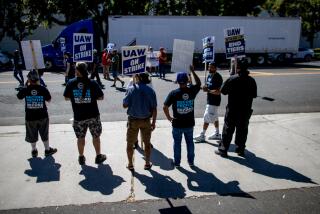Automakers get Bushâs ear, but no promises
WASHINGTON â The chief executives of Detroitâs troubled Big Three automakers finally got to meet with the nationâs chief executive Tuesday, and they emerged from the Oval Office saying they had received an understanding hearing.
âIt was a very good dialogue,â said General Motors Corp. Chairman and Chief Executive Rick Wagoner.
President Bush promised nothing, particularly in response to the executivesâ complaint that Asian countries, notably Japan, were holding the value of their currencies artificially low so that their cars would be cheaper.
Bush, who left hours after the meeting for a conference in Vietnam with Asian trading partners, was not about to roil the waters by complaining of Asian currency manipulation.
Instead, he said afterward that he would tell the Asian leaders: âOur markets are open for your products, and we expect your markets to be open for ours, including our automobiles.â
As far back as April, the heads of GM, Ford and DaimlerChryslerâs Chrysler Group had sought a White House meeting to air their problems.
Bush said the midterm campaign schedule made that impossible until after election day.
During her successful reelection campaign, Sen. Debbie Stabenow (D-Mich.) had criticized Bush for not meeting with the automakers.
On Tuesday, she said she hoped the session would be âan important first step toward a comprehensive American manufacturing strategy that will keep us competitive.â
In addition to trade and currency values, the automakers and the president discussed fuel efficiency, energy security and the increasing burden of healthcare costs.
Tom LaSorda, Chrysler Groupâs president and chief executive, said the three executives emphasized that a small share of autoworkers and retirees were responsible for much of the costs.
âI assured these leaders that the government is addressing rising healthcare costs through a variety of initiatives,â Bush said, including tax-sheltered accounts used to meet health costs when combined with high-deductible health insurance.
On fuel efficiency, the executives said they told Bush that half their fleets would be able to run on ethanol or biodiesel fuel, instead of gasoline, by 2012.
George Magliano, chief auto industry analyst for the economic forecasting firm Global Insight, said nothing would immediately come of Tuesdayâs meeting.
âMost of these issues are long-term,â he said.
Brian Johnson, an auto analyst for the investment bank Lehman Brothers, said the outcome would depend on the coming tug-of-war between coastal Democrats and interior Democrats in the new, Democratic-controlled Congress.
Coastal Democrats tend to be environmentally oriented, he said, whereas those from the countryâs center are more sympathetic to the industryâs plight.
And its condition is serious: In the third quarter, Ford reported a net loss of $5.8 billion and DaimlerChryslerâs U.S. operations lost $1.46 billion. GM lost only $91 million, a sharp upturn after a $10.6-billion loss for all of last year.
*






